- Home
- E. B. White
Charlotte's Web Page 2
Charlotte's Web Read online
Page 2
The goose took command and began to give orders.
"Don't just stand there, Wilbur! Dodge about, dodge about!" cried the goose. "Skip around, run toward me, slip in and out, in and out, in and out! Make for the woods! Twist and turn!"
The cocker spaniel sprang for Wilbur's hind leg. Wilbur jumped and ran. Lurvy reached out and grabbed. Mrs. Zuckerman screamed at Lurvy. The goose cheered for Wilbur. Wilbur dodged between Lurvy's legs. Lurvy missed Wilbur and grabbed the spaniel instead. "Nicely done, nicely done!" cried the goose. "Try it again, try it again!"
"Run downhill!" suggested the cows.
"Run toward me!" yelled the gander.
"Run uphill!" cried the sheep.
"Turn and twist!" honked the goose.
"Jump and dance!" said the rooster.
"Look out for Lurvy!" called the cows.
"Look out for Zuckerman!" yelled the gander.
"Watch out for the dog!" cried the sheep.
"Listen to me, listen to me!" screamed the goose.
Poor Wilbur was dazed and frightened by this hullabaloo. He didn't like being the center of all this fuss. He tried to follow the instructions his friends were giving him, but he couldn't run downhill and uphill at the same time, and he couldn't turn and twist when he was jumping and dancing, and he was crying so hard he could barely see anything that was happening. After all, Wilbur was a very young pig--not much more than a baby, really. He wished Fern were there to take him in her arms and comfort him. When he looked up and saw Mr. Zuckerman standing quite close to him, holding a pail of warm slops, he felt relieved. He lifted his nose and sniffed. The smell was delicious--warm milk, potato skins, wheat middlings, Kellogg's Corn Flakes, and a popover left from the Zuckermans' breakfast.
"Come, pig!" said Mr. Zuckerman, tapping the pail. "Come pig!"
Wilbur took a step toward the pail.
"No-no-no!" said the goose. "It's the old pail trick, Wilbur. Don't fall for it, don't fall for it! He's trying to lure you back into captivity-ivity. He's appealing to your stomach."
Wilbur didn't care. The food smelled appetizing. He took another step toward the pail.
"Pig, pig!" said Mr. Zuckerman in a kind voice, and began walking slowly toward the barnyard, looking all about him innocently, as if he didn't know that a little white pig was following along behind him.
"You'll be sorry-sorry-sorry," called the goose.
Wilbur didn't care. He kept walking toward the pail of slops.
"You'll miss your freedom," honked the goose. "An hour of freedom is worth a barrel of slops."
Wilbur didn't care.
When Mr. Zuckerman reached the pigpen, he climbed over the fence and poured the slops into the trough. Then he pulled the loose board away from the fence, so that there was a wide hole for Wilbur to walk through.
"Reconsider, reconsider!" cried the goose.
Wilbur paid no attention. He stepped through the fence into his yard. He walked to the trough and took a long drink of slops, sucking in the milk hungrily and chewing the popover. It was good to be home again.
While Wilbur ate, Lurvy fetched a hammer and some 8-penny nails and nailed the board in place. Then he and Mr. Zuckerman leaned lazily on the fence and Mr. Zuckerman scratched Wilbur's back with a stick.
"He's quite a pig," said Lurvy.
"Yes, he'll make a good pig," said Mr. Zuckerman.
Wilbur heard the words of praise. He felt the warm milk inside his stomach. He felt the pleasant rubbing of the stick along his itchy back. He felt peaceful and happy and sleepy. This had been a tiring afternoon. It was still only about four o'clock but Wilbur was ready for bed.
"I'm really too young to go out into the world alone," he thought as he lay down.
IV. Loneliness
THE NEXT day was rainy and dark. Rain fell on the roof of the barn and dripped steadily from the eaves. Rain fell in the barnyard and ran in crooked courses down into the lane where thistles and pigweed grew. Rain spattered against Mrs. Zuckerman's kitchen windows and came gushing out of the downspouts. Rain fell on the backs of the sheep as they grazed in the meadow. When the sheep tired of standing in the rain, they walked slowly up the lane and into the fold.
Rain upset Wilbur's plans. Wilbur had planned to go out, this day, and dig a new hole in his yard. He had other plans, too. His plans for the day went something like this:
Breakfast at six-thirty. Skim milk, crusts, middlings, bits of doughnuts, wheat cakes with drops of maple syrup sticking to them, potato skins, leftover custard pudding with raisins, and bits of Shredded Wheat.
Breakfast would be finished at seven.
From seven to eight, Wilbur planned to have a talk with Templeton, the rat that lived under his trough. Talking with Templeton was not the most interesting occupation in the world but it was better than nothing.
From eight to nine, Wilbur planned to take a nap outdoors in the sun.
From nine to eleven he planned to dig a hole, or trench, and possibly find something good to eat buried in the dirt.
From eleven to twelve he planned to stand still and watch flies on the boards, watch bees in the clover, and watch swallows in the air.
Twelve o'clock--lunchtime. Middlings, warm water, apple parings, meat gravy, carrot scrapings, meat scraps, stale hominy, and the wrapper off a package of cheese. Lunch would be over at one.
From one to two, Wilbur planned to sleep.
From two to three, he planned to scratch itchy places by rubbing against the fence.
From three to four, he planned to stand perfectly still and think of what it was like to be alive, and to wait for Fern.
At four would come supper. Skim milk, provender, leftover sandwich from Lurvy's lunchbox, prune skins, a morsel of this, a bit of that, fried potatoes, marmalade drippings, a little more of this, a little more of that, a piece of baked apple, a scrap of upsidedown cake.
Wilbur had gone to sleep thinking about these plans. He awoke at six and saw the rain, and it seemed as though he couldn't bear it.
"I get everything all beautifully planned out and it has to go and rain," he said.
For a while he stood gloomily indoors. Then he walked to the door and looked out. Drops of rain struck his face. His yard was cold and wet. His trough had an inch of rainwater in it. Templeton was nowhere to be seen.
"Are you out there, Templeton?" called Wilbur. There was no answer. Suddenly Wilbur felt lonely and friendless.
"One day just like another," he groaned. "I'm very young, I have no real friend here in the barn, it's going to rain all morning and all afternoon, and Fern won't come in such bad weather. Oh, honestly!" And Wilbur was crying again, for the second time in two days.
At six-thirty Wilbur heard the banging of a pail. Lurvy was standing outside in the rain, stirring up breakfast.
"C'mon, pig!" said Lurvy.
Wilbur did not budge. Lurvy dumped the slops, scraped the pail, and walked away. He noticed that something was wrong with the pig.
Wilbur didn't want food, he wanted love. He wanted a friend--someone who would play with him. He mentioned this to the goose, who was sitting quietly in a corner of the sheepfold.
"Will you come over and play with me?" he asked.
"Sorry, sonny, sorry," said the goose. "I'm sitting-sitting on my eggs. Eight of them. Got to keep them toasty-oasty-oasty warm. I have to stay right here, I'm no flibberty-ibberty-gibbet. I do not play when there are eggs to hatch. I'm expecting goslings."
"Well, I didn't think you were expecting woodpeckers," said Wilbur, bitterly.
Wilbur next tried one of the lambs.
"Will you please play with me?" he asked.
"Certainly not," said the lamb. "In the first place, I cannot get into your pen, as I am not old enough to jump over the fence. In the second place, I am not interested in pigs. Pigs mean less than nothing to me."
"What do you mean, less than nothing?" replied Wilbur. "I don't think there is any such thing as less than nothing. Nothing is absolutely the li
mit of nothingness. It's the lowest you can go. It's the end of the line. How can something be less than nothing? If there were something that was less than nothing, then nothing would not be nothing, it would be something--even though it's just a very little bit of something. But if nothing is nothing, then nothing has nothing that is less than it is."
"Oh, be quiet!" said the lamb. "Go play by yourself! I don't play with pigs."
Sadly, Wilbur lay down and listened to the rain. Soon he saw the rat climbing down a slanting board that he used as a stairway.
"Will you play with me, Templeton?" asked Wilbur.
"Play?" said Templeton, twirling his whiskers. "Play? I hardly know the meaning of the word."
"Well," said Wilbur, "it means to have fun, to frolic, to run and skip and make merry."
"I never do those things if I can avoid them," replied the rat, sourly. "I prefer to spend my time eating, gnawing, spying, and hiding. I am a glutton but not a merry-maker. Right now I am on my way to your trough to eat your breakfast, since you haven't got sense enough to eat it yourself." And Templeton, the rat, crept stealthily along the wall and disappeared into a private tunnel that he had dug between the door and the trough in Wilbur's yard. Templeton was a crafty rat, and he had things pretty much his own way. The tunnel was an example of his skill and cunning. The tunnel enabled him to get from the barn to his hiding place under the pig trough without coming out into the open. He had tunnels and runways all over Mr. Zuckerman's farm and could get from one place to another without being seen. Usually he slept during the daytime and was abroad only after dark.
Wilbur watched him disappear into his tunnel. In a moment he saw the rat's sharp nose poke out from underneath the wooden trough. Cautiously Templeton pulled himself up over the edge of the trough. This was almost more than Wilbur could stand: on this dreary, rainy day to see his breakfast being eaten by somebody else. He knew Templeton was getting soaked, out there in the pouring rain, but even that didn't comfort him. Friendless, dejected, and hungry, he threw himself down in the manure and sobbed.
Late that afternoon, Lurvy went to Mr. Zuckerman. "I think there's something wrong with that pig of yours. He hasn't touched his food."
"Give him two spoonfuls of sulphur and a little molasses," said Mr. Zuckerman.
Wilbur couldn't believe what was happening to him when Lurvy caught him and forced the medicine down his throat. This was certainly the worst day of his life. He didn't know whether he could endure the awful loneliness any more.
Darkness settled over everything. Soon there were only shadows and the noises of the sheep chewing their cuds, and occasionally the rattle of a cow-chain up overhead. You can imagine Wilbur's surprise when, out of the darkness, came a small voice he had never heard before. It sounded rather thin, but pleasant. "Do you want a friend, Wilbur?" it said. "I'll be a friend to you. I've watched you all day and I like you."
"But I can't see you," said Wilbur, jumping to his feet. "Where are you? And who are you?"
"I'm right up here," said the voice. "Go to sleep. You'll see me in the morning."
V. Charlotte
THE NIGHT seemed long. Wilbur's stomach was empty and his mind was full. And when your stomach is empty and your mind is full, it's always hard to sleep.
A dozen times during the night Wilbur woke and stared into the blackness, listening to the sounds and trying to figure out what time it was. A barn is never perfectly quiet. Even at midnight there is usually something stirring.
The first time he woke, he heard Templeton gnawing a hole in the grain bin. Templeton's teeth scraped loudly against the wood and made quite a racket. "That crazy rat!" thought Wilbur. "Why does he have to stay up all night, grinding his clashers and destroying people's property? Why can't he go to sleep, like any decent animal?"
The second time Wilbur woke, he heard the goose turning on her nest and chuckling to herself.
"What time is it?" whispered Wilbur to the goose.
"Probably-obably-obably about half-past eleven," said the goose. "Why aren't you asleep, Wilbur?"
"Too many things on my mind," said Wilbur.
"Well," said the goose, "that's not my trouble. I have nothing at all on my mind, but I've too many things under my behind. Have you ever tried to sleep while sitting on eight eggs?"
"No," replied Wilbur. "I suppose it is uncomfortable. How long does it take a goose egg to hatch?"
"Approximately-oximately thirty days, all told," answered the goose. "But I cheat a little. On warm afternoons, I just pull a little straw over the eggs and go out for a walk."
Wilbur yawned and went back to sleep. In his dreams he heard again the voice saying, "I'll be a friend to you. Go to sleep--you'll see me in the morning."
About half an hour before dawn, Wilbur woke and listened. The barn was still dark. The sheep lay motionless. Even the goose was quiet. Overhead, on the main floor, nothing stirred: the cows were resting, the horses dozed. Templeton had quit work and gone off somewhere on an errand. The only sound was a slight scraping noise from the rooftop, where the weather-vane swung back and forth. Wilbur loved the barn when it was like this--calm and quiet, waiting for light.
"Day is almost here," he thought.
Through a small window, a faint gleam appeared. One by one the stars went out. Wilbur could see the goose a few feet away. She sat with head tucked under a wing. Then he could see the sheep and the lambs. The sky lightened.
"Oh, beautiful day, it is here at last! Today I shall find my friend."
Wilbur looked everywhere. He searched his pen thoroughly. He examined the window ledge, stared up at the ceiling. But he saw nothing new. Finally he decided he would have to speak up. He hated to break the lovely stillness of dawn by using his voice, but he couldn't think of any other way to locate the mysterious new friend who was nowhere to be seen. So Wilbur cleared his throat.
"Attention, please!" he said in a loud, firm voice. "Will the party who addressed me at bedtime last night kindly make himself or herself known by giving an appropriate sign or signal!"
Wilbur paused and listened. All the other animals lifted their heads and stared at him. Wilbur blushed. But he was determined to get in touch with his unknown friend.
"Attention, please!" he said. "I will repeat the message. Will the party who addressed me at bedtime last night kindly speak up. Please tell me where you are, if you are my friend!"
The sheep looked at each other in disgust.
"Stop your nonsense, Wilbur!" said the oldest sheep. "If you have a new friend here, you are probably disturbing his rest; and the quickest way to spoil a friendship is to wake somebody up in the morning before he is ready. How can you be sure your friend is an early riser?"
"I beg everyone's pardon," whispered Wilbur. "I didn't mean to be objectionable."
He lay down meekly in the manure, facing the door. He did not know it, but his friend was very near. And the old sheep was right--the friend was still asleep.
Soon Lurvy appeared with slops for breakfast. Wilbur rushed out, ate everything in a hurry, and licked the trough. The sheep moved off down the lane, the gander waddled along behind them, pulling grass. And then, just as Wilbur was settling down for his morning nap, he heard again the thin voice that had addressed him the night before.
"Salutations!" said the voice.
Wilbur jumped to his feet. "Salu-what?" he cried.
"Salutations!" repeated the voice.
"What are they, and where are you?" screamed Wilbur. "Please, please, tell me where you are. And what are salutations?"
"Salutations are greetings," said the voice. "When I say 'salutations,' it's just my fancy way of saying hello or good morning. Actually, it's a silly expression, and I am surprised that I used it at all. As for my whereabouts, that's easy. Look up here in the corner of the doorway! Here I am. Look, I'm waving!"
At last Wilbur saw the creature that had spoken to him in such a kindly way. Stretched across the upper part of the doorway was a big spiderweb, and hangin
g from the top of the web, head down, was a large grey spider. She was about the size of a gumdrop. She had eight legs, and she was waving one of them at Wilbur in friendly greeting. "See me now?" she asked.
"Oh, yes indeed," said Wilbur. "Yes indeed! How are you? Good morning! Salutations! Very pleased to meet you. What is your name, please? May I have your name?"
"My name," said the spider, "is Charlotte."
"Charlotte what?" asked Wilbur, eagerly.
"Charlotte A. Cavatica. But just call me Charlotte."
"I think you're beautiful," said Wilbur.
"Well, I am pretty," replied Charlotte. "There's no denying that. Almost all spiders are rather nice-looking. I'm not as flashy as some, but I'll do. I wish I could see you, Wilbur, as clearly as you can see me."
"Why can't you?" asked the pig. "I'm right here."
"Yes, but I'm near-sighted," replied Charlotte. "I've always been dreadfully near-sighted. It's good in some ways, not so good in others. Watch me wrap up this fly."
A fly that had been crawling along Wilbur's trough had flown up and blundered into the lower part of Charlotte's web and was tangled in the sticky threads. The fly was beating its wings furiously, trying to break loose and free itself.
"First," said Charlotte, "I dive at him." She plunged headfirst toward the fly. As she dropped, a tiny silken thread unwound from her rear end.
"Next, I wrap him up." She grabbed the fly, threw a few jets of silk around it, and rolled it over and over, wrapping it so that it couldn't move. Wilbur watched in horror. He could hardly believe what he was seeing, and although he detested flies, he was sorry for this one.
"There!" said Charlotte. "Now I knock him out, so he'll be more comfortable." She bit the fly. "He can't feel a thing now," she remarked. "He'll make a perfect breakfast for me."
"You mean you eat flies?" gasped Wilbur.
"Certainly. Flies, bugs, grasshoppers, choice beetles, moths, butterflies, tasty cockroaches, gnats, midges, daddy longlegs, centipedes, mosquitoes, crickets--anything that is careless enough to get caught in my web. I have to live, don't I?"
"Why, yes, of course," said Wilbur. "Do they taste good?"
"Delicious. Of course, I don't really eat them. I drink them--drink their blood. I love blood," said Charlotte, and her pleasant, thin voice grew even thinner and more pleasant.

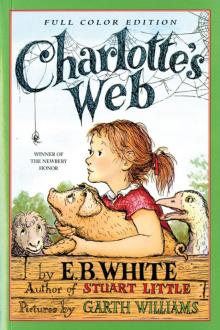 Charlotte's Web
Charlotte's Web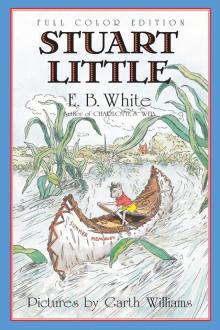 Stuart Little
Stuart Little The Elements of Style
The Elements of Style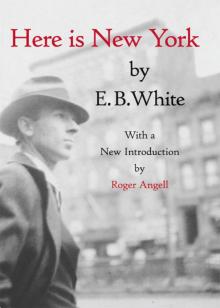 Here Is New York
Here Is New York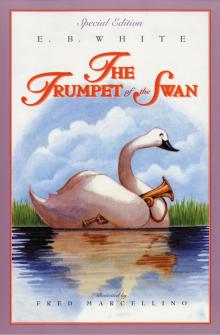 The Trumpet of the Swan
The Trumpet of the Swan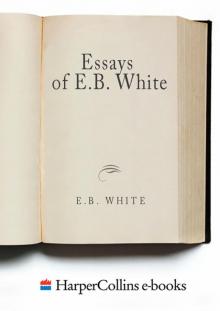 Essays of E. B. White
Essays of E. B. White Writings from the New Yorker 1925-1976
Writings from the New Yorker 1925-1976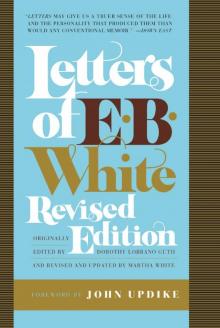 Letters of E. B. White
Letters of E. B. White